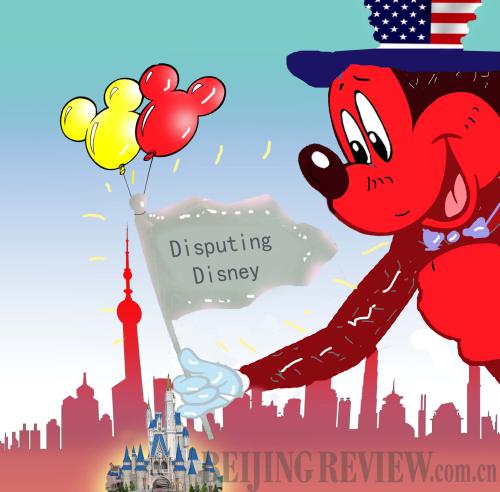|
 |
|
(LI SHIGONG) |
Mickey Mouse and Donald Duck are mounting the stage in Shanghai!
The Information Office of the Shanghai Municipal Government said on November 4 that the Walt Disney Co. had been given approval to build a new theme park in Shanghai—the sixth of its kind in the world and the third in Asia.
While children are applauding the news, some people are wondering if this is the start of a new round of "cultural invasion" or an opportunity for industrial upgrading and cultural exchanges.
Widely deemed as a major symbol of American culture, Disneyland's forays into overseas markets have encountered twists and turns.
The construction of a Disney theme park in Paris was strongly opposed by French critics who denounced the park as a U.S. cultural nuclear leak. According to media reports, big losses incurred by Disneyland in Paris were due partly to Europeans' dislike of U.S. culture.
A survey conducted by China's news portal huanqiu.com also shows that only 22.7 percent of the 3,000 respondents liked American culture as represented by Disneyland, 50.3 percent of them voted against it, while 27 percent said they didn't care. Some netizens said, "The United States has such a strong 'soft power' that they can get a windfall from China by showing off a history of merely a few hundred years. It is not conducive to the Chinese people in the long run if we give more land to showcase this American brand."
Further, concerned parties are worried that when Chinese children eat American fast food and spend their childhood enjoying Disneyland, they probably would forget and ignore their own country's traditional culture.
However, supporters contend that Disneyland is not a dreadful monster. China and the United States need cultural interaction and communication. Some critics point out only when Disneyland merges with local culture can it fully achieve commercial success in a local market, and the accusation of "cultural invasion" is exaggerated.
Li Xiangping, a philosophy professor at the East China Normal University, said the newly approved Shanghai Disneyland was a kind of introduction to U.S culture, and could possibly bring more cultural cooperation programs in the future. He argued Disneyland would not have a big influence on Chinese culture.
Big culture trap
Sun Xiliang (wyzxsx.com): The fundamental feature of Disneyland is huge-scale Americanized entertainment programming. Actually, its entertainment programs can be seen at any major park in China, only but are the latter is not big or comprehensive enough. Except for the cultural brand, no program in Disneyland is irreplaceable. This means if the Chinese people truly want to create entertainment programs with unique national features, they certainly can build a cultural theme park with its own cultural significance, which would be larger and more profound. But why don't the Chinese people build their own theme park? There are two major reasons. First, our people nowadays are inclined to depend on overseas culture. Second, it is the result of Westernized education. We copy the Westerners' way of doing things and cultivate a large number of young people who have abandoned traditional culture and pursue Western culture.
At present, the majority of Chinese intellectuals and so-called mainstream elites dare not use the phrase "cultural protection," because they are afraid of being associated with "culturally protectionists" or "shallow-
minded people." Whenever it comes to Western cultural invasion, some people immediately jump out, spouting nonsense such as "culture has no boundaries" or "it is essential to integrate Chinese culture with influences from abroad." They tend to believe those who do not accept Western culture cannot be truly called modern social elites.
| 